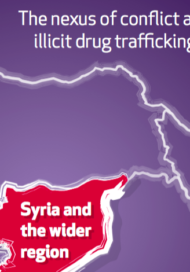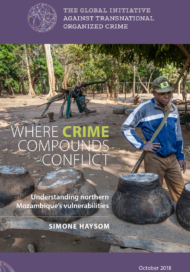Posted on 03 Sep 2014
Dr. Jorge Chabat is currently head of the Division of International Studies at the Center for Research and Teaching on Economics (CIDE) in Mexico City. Dr. Chabat is a security and drug trafficking analyst and one of the country’s top experts on foreign policy. Dr. Chabat has served as a Member of the Admissions Advisory Board for the Mexican Foreign Service and has coordinated several academic projects on democracy, governance and globalization. He is also a prominent voice in Mexico’s broadcast media, being a regular commentator on national radio and television and a contributor on newspapers and magazines.
Dr. Chabat first started studying drug trafficking by “accident” when he was doing his Masters in International Affairs at the University of Miami in Florida. One of his professors advised him to look at the issue of drugs in the context of international relations. Dr. Chabat remembers how drug smuggling was only an emerging issue in the global arena back then. He is happy he followed the advice because today he says “you can’t understand the global environment without looking at the issue of drug trafficking and organized crime”.
For decades, Dr. Chabat has monitored closely the evolution of organized crime in Mexico. He has studied the transformation of small-town drug gangs into transnational commercial enterprises, blurring the lines between the licit and illicit international trade.
Dr. Chabat, why is it important to activate the global dialogue to address transnational organized crime?
Organized crime in all its manifestations is a truly globalized phenomenon. It is impossible to isolate criminal activities in any country or region. To understand the full picture you have to look at how connections expand all over the world. Criminal networks operate across borders, crossing the boundaries of what is legal. When we look at it globally, we see problems that repeat themselves and solutions that can be applied in more than one country.
As an internationalist, I am keen to reinvigorate the dialogue on transnational organized crime, and Mexico has a lot to offer in terms of lessons that can certainly be applied in other parts of the world.
I am pleased to see the efforts of the Global Initiative to add new perspectives to the discussion. There are several regional initiatives addressing organized crime, but there was a need to establish a global platform to exchange experiences. There is a lot of knowledge to share and the Global Initiative is an optimal forum to bring up innovative approaches.
Why is it important to understand organized crime in the framework of international relations?
Certain organized crime groups have become as powerful as local and regional governments in some parts of the world. And they have branches in many countries. These networks may not have an official website, but they are concrete, established organizations affecting the way countries engage with each other.
In Mexico, we are seeing how criminal networks are using the proceeds of their crimes to expand into other licit businesses. They also trade with legitimate industries outside the country. Without a doubt, organized crime groups constitute a real power factor in the global political and economical environment.
In general, what lessons you think we can draw from looking at Organized Crime in Mexico?
The main lesson we can learn from Mexico’s experience is that we need strong foundations to fight crime. Organized crime is always evolving and it tends to take over weakened institutions to continue growing. For a long time, the Mexican Government did not pay enough attention to building solid institutions and the result is what we are seeing now. But I think we are now in the process of strengthening our institutions. It is going to take a long time, but there is hope.
The lesson here is that you don’t have to wait until OC crime has spread everywhere to strengthen the institutions that will give the government the required stability to face the problem. That lesson came at the very high cost of many lives.
How do you see the situation of Mexico evolving into the future?
It will all depend on the evolution of the government itself. Organized crime has gone from a predatory to a parasitic stage. It is a fact that criminal networks have penetrated the state. In some parts of the country, they even control the government. It is a real challenge for the Mexican Government to reverse this situation. Nevertheless, if the government invests in building effective institutions, we can start seeing results in maybe ten years.
The issue is that organized crime groups are now embedded in society. Criminals are increasingly combining criminal practices with legal activities. They invest in legal enterprises but use illegal methods to compete. Organized crime networks are now more powerful than ever. The main challenge is to restore the rule of law and for that, we are going to need strong institutions.
How do you see the involvement of society in the fight against OC?
We are now seeing all kinds of responses. We have the self-defense militias in Michoacan and other states. But these are obviously not ideal scenarios. We have seen in the past similar groups turn into organized crime in the long run. The optimal case is when the community cooperates with the authorities. But for that to happen, authorities need to be reliable and trustworthy.
The solution to the dilemma lies within the community itself. We need the full cooperation of civil society to face organized crime. But if society can’t trust its authorities, we need first to work on that. That is why I believe it is urgent and important to start building strong institutions.



